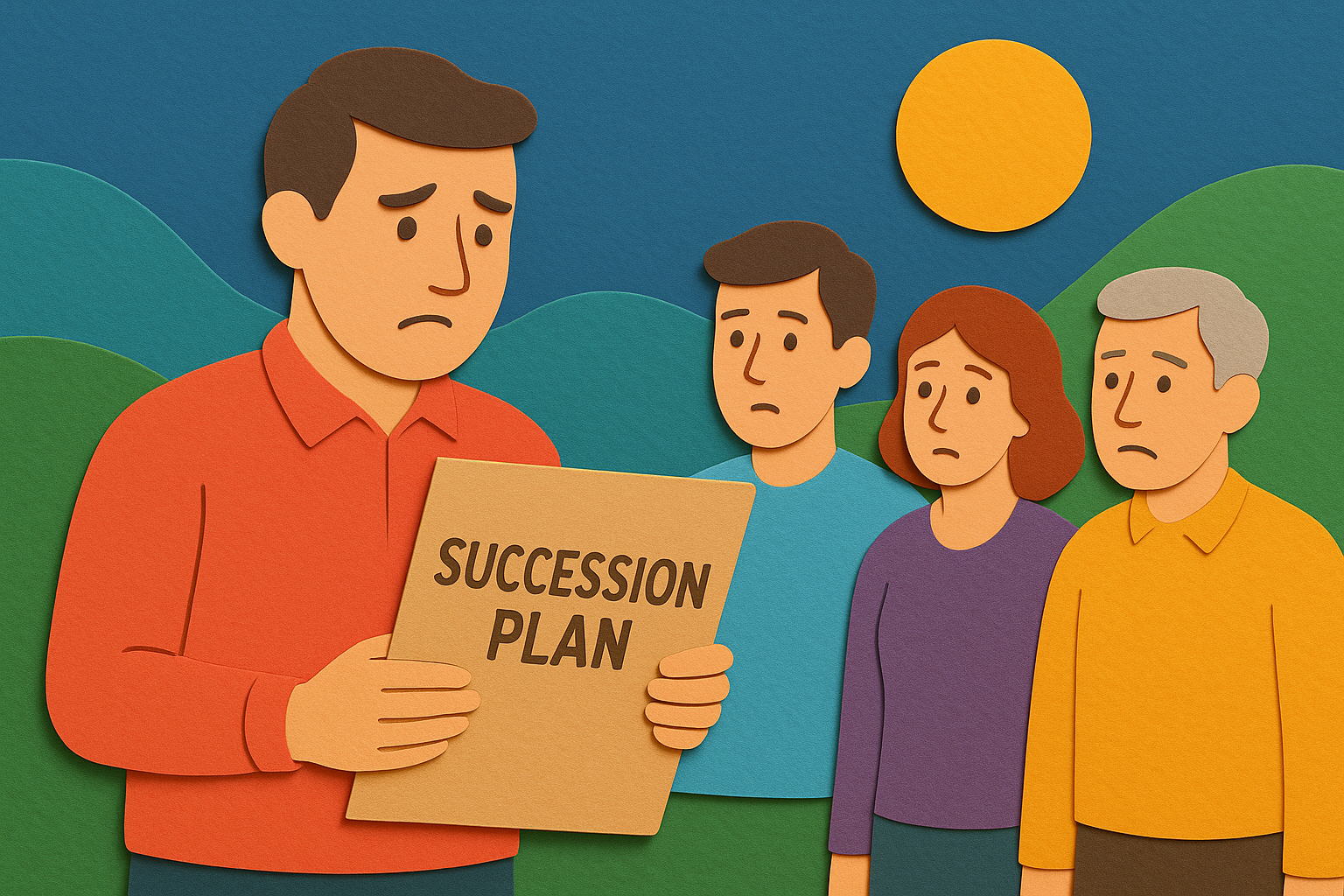
Debunking Legal Myths About Business Succession Lawyers
Let’s be honest. Most business owners don’t leap at the chance to work with a lawyer, especially a business succession planning lawyer, since succession planning can feel complicated and overwhelming.
We get it. It sounds complicated. Maybe even expensive. And if we’re being really honest? A little uncomfortable.
That’s why so many entrepreneurs and family business owners put it off. Not because they don’t care, but because they’ve heard myths, things that sound true, feel true, but just aren’t.
“I don’t need that yet.”
“It’s going to cost a fortune.”
“My CPA has me covered.”
“I already have a will. Isn’t that enough?”
So today, we’re setting the record straight.
If you’ve been hesitating to talk with a business succession planning lawyer, this post is for you. We’re busting the most common legal myths we hear in our office, the kind that cost families dearly if they’re not addressed early.
Myth #1: “I Already Have a Will. I Don’t Need a Succession Plan.”
Yes, having a will is important. But a will is designed to distribute your personal assets after death. It does not ensure your business:
-
Continues operating
-
Passes to the right people
-
Avoids legal complications
-
Maintains its value during transition
In fact, a will may even create probate delays that can disrupt or destroy your company. And it doesn’t cover:
-
What happens if you become incapacitated
-
How business shares are valued or sold
-
Who takes over daily operations
-
How to protect partners or employees
A business succession plan addresses all of that. It’s built specifically to answer the question:
“What happens to the business if I step away, voluntarily or not?”
If you own a business, you need both an estate plan and a business succession strategy, ideally aligned and drafted by professionals who understand the difference.
Myth #2: “Succession Planning Is Only for Retirement.”
This one is dangerous and unfortunately, widespread.
Many owners treat succession planning like a retirement project. They’ll get to it “later,” when they’re done growing, expanding, or too tired to work.
But what if “later” never comes?
Succession planning is about readiness, not retirement. It’s about being prepared for:
-
A sudden illness or accident
-
A partner’s unexpected exit
-
A change in family dynamics
-
Market shifts or acquisition offers
The best plans are made before you’re ready to step away, not in the middle of a crisis. That’s how you protect your business, your family, and your peace of mind.
Myth #3: “It’s Too Expensive.”
Hiring a lawyer can feel like opening a blank check. But here’s the better question:
“What would it cost me not to do this?”
The cost of succession planning is usually a fraction of what you’d lose if:
-
Your business enters probate
-
Your heirs fight over ownership
-
A partner exits without a buy-sell agreement
-
A key employee leaves because of leadership confusion
Good succession planning doesn’t just save money. It protects everything you’ve built.
At Hackard Law, we’re transparent about costs. We offer flat-fee options when possible, or hybrid models where you only pay for the complexity you need.
Think of it like insurance for your legacy. Instead of just writing a check, you’re building clarity, stability, and long-term value.
Myth #4: “My CPA or Financial Advisor Is Handling It.”
We love working with CPAs and financial advisors. They’re essential to great planning. But they’re not lawyers and they can’t draft legally binding documents.
Here’s how it works:
-
Your CPA helps with tax strategy and financial forecasting.
-
Your financial advisor helps manage assets and investments.
-
Your succession lawyer drafts the legal framework that makes it all enforceable.
When you bring us into your team, we don’t replace those professionals. We collaborate with them.
A great succession plan needs all three working in harmony. Otherwise, you risk building a plan that sounds good on paper but falls apart in court.
Related Reading: Estate Disputes and Fiduciary Breaches: Protecting Your Legacy
Myth #5: “I’ll Just Hand It Over to My Kids When I’m Ready.”
We hear this one a lot. And while it sounds noble, it’s rarely that simple.
What happens if:
-
One child wants to sell and the other doesn’t?
-
Your kids aren’t ready, or qualified, to lead?
-
There’s disagreement about roles, salaries, or decision-making?
-
Someone gets divorced, and the ex now owns part of your business?
We’ve seen family businesses torn apart because the handoff wasn’t clear or fair. Succession planning helps you:
-
Identify the right successors
-
Prepare them gradually
-
Protect non-involved heirs
-
Create clear roles, rights, and expectations
If keeping the business in the family is your goal, we’ll help you do that. Not by crossing your fingers, but by building a structure that works.
Myth #6: “We’re a Small Business. We Don’t Need That.”
Whether your company has 5 employees or 500, the question remains:
What happens if the person in charge is suddenly gone?
If you’re a small business, the impact is even more personal. The family depends on it, the team is close-knit, and the reputation is local.
And without a plan, a single legal misstep like failing to assign power of attorney, or not documenting your successor can send everything into free fall.
The smaller and more personal your business, the more urgent your planning needs to be.
Succession planning isn’t about size. It’s about stability.
Myth #7: “If Something Happens, My Family Will Figure It Out.”
They might. But at what cost?
In times of crisis, families aren’t thinking clearly. They’re grieving. They’re overwhelmed. And if your wishes aren’t legally documented, they’re left guessing.
That’s how families end up in courtrooms, siblings stop talking, and legacies fall apart.
Your loved ones shouldn’t have to figure it out. They should be able to follow a clear, legally binding plan you created when you were at your best.
Succession planning isn’t just for your peace of mind. It’s a gift to the people you love.
Myth #8: “Succession Planning Is One-and-Done.”
This myth keeps people stuck. They meet with a lawyer once, sign a few papers, and call it good forever.
But succession planning is a living process, your business, your team, and even your family may change. That’s why ongoing reviews are vital… To see how trust planning can safeguard you and your loved ones against the unexpected, check out How a Trusts Lawyer Prepares You for the Unexpected.
-
Your business changes.
-
Your team changes.
-
Tax laws change.
-
Your family changes.
And when they do, your plan should evolve too.
That’s why we offer ongoing reviews and help you keep everything aligned, so that the plan you make at 55 still works when you’re 65.
Think of us like your business’s legal maintenance partner. Always ready to update, refine, and protect your future.
Real-Life Outcomes of Believing Legal Myths
❌ Case 1: The “My CPA Is Handling It” Myth
A client once came to us after their business partner passed away. The surviving owner was shocked to find no legal documents existed, despite assurances from the deceased partner’s CPA that “everything was taken care of.”
No buy-sell agreement.
>No powers of attorney.
>No formal valuation strategy.
The result? The deceased partner’s spouse inherited his ownership stake and demanded controlling say in the business.
It took 18 months of negotiation and six figures in legal fees to resolve. This could have been avoided with a well-crafted agreement.
❌ Case 2: The “I’ll Just Hand It to My Kids” Myth
A successful contractor planned to “pass the business” to his son. w
When he passed unexpectedly, his three children inherited the company equally. Only one had ever worked in it.
Without authority or voting control, the son managing operations was blocked at every step. The business eventually dissolved.
A succession lawyer could have structured a transfer plan, preserved operational continuity, and balanced inheritances through other assets or insurance.
Why So Many Owners Avoid Planning
Succession planning requires you to think about uncomfortable things:
-
What happens if I get sick?
-
What if I die?
-
What if my family doesn’t want the business?
-
What if they do and mess it up?
These aren’t easy questions. A good succession planning lawyer approaches them with empathy, not pressure. At Hackard Law, we walk at your pace, ask the right questions, and help you make decisions rooted in your values.
The Cost of Waiting Too Long
One final myth worth busting: “I’ve got time.”
The hard truth? Maybe you don’t.
We’ve worked with clients who:
-
Had a sudden health event
-
Lost a key employee or partner
-
Faced a surprise offer to buy their company
-
Experienced a family shift (divorce, remarriage, addiction, estrangement)
Waiting narrows your options. Planning ahead lets you choose, not react.
What a Great Succession Lawyer Really Does
You’re not just hiring someone to write documents. You’re hiring:
-
A strategist to align business and estate planning
-
A negotiator to balance competing interests
-
A coach to prepare successors and guide your family
-
A translator to turn your wishes into enforceable terms
-
A defender to spot legal and tax risks early
-
A relationship builder who collaborates with your CPA, financial advisor, and team
When done right, this is a relationship that spans years, not months.
We’re not just preparing your plan. We’re protecting the people and purpose behind it.
Don’t Let Myths Hold You Back
You’ve built something remarkable. A business that supports your family, your employees, and your community.
Don’t let fear or misinformation keep you from protecting it.
A business succession planning lawyer isn’t here to make life harder. We’re here to make it clearer. To give you the tools, language, and structure you need to step back with confidence whether next year or 20 years from now.
So if these myths have held you back, let this be your sign to take action.
Contact us at Hackard Law today to start the conversation. Your legacy is worth it.

 (916) 775-8542
(916) 775-8542 